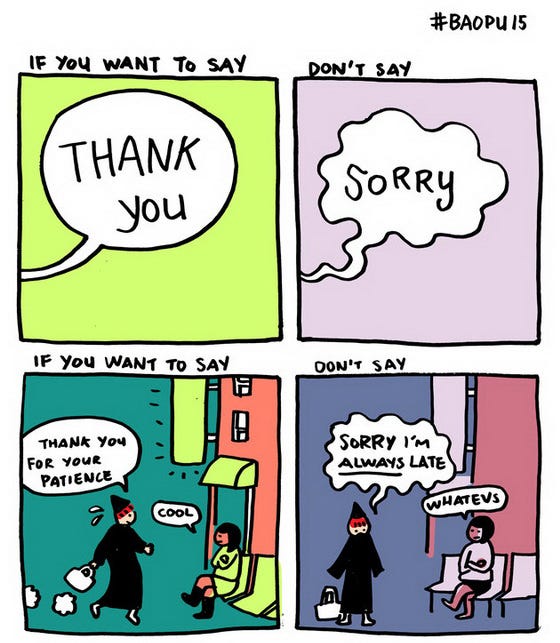Chronically Cheerful #10: Empower yourself.
Self advocacy, more confident emails, and swaps for saying sorry.
Hi friends,
Good communication is the key to any relationship—whether with a doctor, a friend, or a partner. Yet after I was diagnosed with chronic migraine, I had a lot of trouble speaking about my lived experience and navigating the changes to my life.
At first, I didn’t have the right language to describe my condition and often was reluctant to ask for help. Speaking up can be scary, especially when you’ve been misunderstood, dismissed, or even disbelieved in the past. I felt alone and like I didn’t know how to get the help I desperately needed.
In time, I’ve learned how to stand up for myself and my migraine-related needs. With practice, I've become a stronger self-advocate by:
🤓 Educating myself on chronic migraine,
🗣️ Speaking up during doctor appointments,
🙋♀️ Asking for accommodations, and
🙅♀️ setting better boundaries.
In this picture, you’ll see me using a wheelchair during a recent trip while in the airport. It was an exercise in advocating for myself during a time when I needed extra support. While migraine may not be the expected cause for a wheelchair, this accommodation was essential to helping me endure the airport when I had a severe migraine attack.👩🦽
Want to know more about which practices have helped me strengthen my self-advocacy and why? Read more about my experience in my latest article for Healthgrades.
Speaking up about your needs can be scary, and takes practice–but it’s worth it. Communicating clearly and advocating for yourself can lead to stronger relationships and improved care for your well-being.
What has helped you the most with your self-advocacy, and where do you struggle? Share your thoughts in the comments below!
Yours in healing,
Carolyn
Try This
Do you struggle to send assertive emails?
This girl does!
My people pleasing tendencies 100% leak over into my email exchanges. A strong desire to avoid conflict or seem likable can water down my ideas and opinions.
For anyone else out there who struggles to communicate without qualifying language, I’ve found something that can help. There’s a free Google Chrome extension called Just Not Sorry, which is basically a spell-check for when you use words that undermine your message. It underlines “self-sabotaging” words and phrases like, “Just,” “Sorry,” “Actually,” “I think,” “Does that make sense?” and “I’m not an expert.”
The extension also alerts you when you’ve exceeded their recommended two exclamation points in a work email. As a self-professed exclamation point over-user, I find this an incredibly helpful (albeit somewhat embarrassing) callout.
Having something explicitly check my automatic patterns encourages me to use more empowering language before I press send. What are some undermining phrases or words you could starting letting go of, or even replacing?
Consider This
Speaking of “Just Not Sorry,” over-apologizing is something that I’ve consistently struggled with throughout my entire life.
Saying “sorry” has almost become an automatic response for many of us in many social circumstances. But saying sorry is really only necessary when wrongdoing has occurred. The more you apologize, the more likely you are to feel as though you’ve done something wrong when you haven’t…and to feel guilty when there is no need. (Guilty as charged! 🤦♀️)
In many situations, there’s a different way to interact that will not only fulfill your need to acknowledge your feelings, but also enable the other person to feel better.
The key to this shift is a simple "Thank you.” Research shows that by saying "thank you" instead of "sorry," your conversations become more about appreciation, which helps boost your self-esteem and others' satisfaction.
Here are some some swaps for what you could say instead of sorry:
“Thank you for being here for me.” vs “Sorry for burdening you.”
“Thank you for listening.” vs “I’m sorry for rambling.”
“Thank you for helping me through this.” vs “I’m so sorry I needed help.”
“Thank you for understanding.” vs “I’m sorry I can’t do this right now.”
“Thank you for being so accommodating.” vs “I’m sorry I needed this flexibility.”
“Thank you for being so patient.” vs “I’m so sorry I have to go slower.”
“Thank you for honoring my needs.” vs “I’m sorry I am so maintenance.”
“Thank you so much for helping me fix this.” vs “I’m sorry I messed up.”
“Thank you for holding space for me.” vs “I’m sorry I’m so needy.”
“Thank you for spending time with me.” vs “Sorry for taking up all your time.”










The swapping Thank You for Sorry suggestions are wonderful. I appreciate you sharing that!